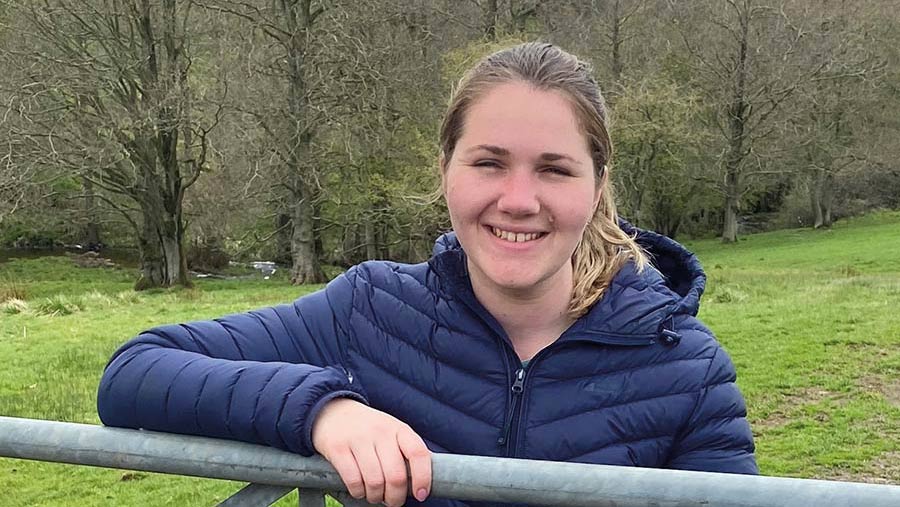Q&A with NFYFC leader Rachel Goldie
 @ Rachel Goldie
@ Rachel Goldie Rachel Goldie, 27, is chairman of the National Federation of Young Farmers’ Clubs (NFYFC).
She was recently elected to the role 25 years after her father held the same position.
We caught up with her to ask her views on everything from her new role to the future for young people post pandemic.
See also: Survey reveals how young farmers view their future
What will your priorities be in the role?
Supporting members and YFCs as we emerge from Covid restrictions. I want to be there to encourage club officials to get programmes and activities started again once it’s allowed.
I want members to enjoy going to meetings and being together again, and I’m hoping this results in more people joining the organisation, too.
The pandemic has pushed the federation to adapt to more digital solutions and this is certainly going to be a focus over the next 12 months and beyond.
Some clubs have been making the most of virtual platforms, and we hope we can continue to incorporate some online access to meetings – it’s useful for those who can’t travel but still want to be part of the decision-making.
For the NFYFC council, it will also allow us to use our time more efficiently and reduce the impact on the environment by making fewer journeys.
Members also voted for an increase in our membership age to 28 from 1 September, so it will be interesting to see how this affects the organisation too.
How can NFYFC turn around the financial shortfall it’s facing?
We restructured the staff team and reduced overheads and, with many of the competitions cancelled last year, we did not have the usual costs associated with venue hire.
The shortfall will result from reduced subscription because of a fall in membership during the pandemic.
It will be significant in late 2021 and into 2022 as the board decided to support YFCs and county federations by providing a 60% discount to the NFYFC subscription for one year to encourage membership renewals and recruitment.
NFYFC will draw funds from its strong reserves to give YFCs and county federations a 12-month buffer to re-establish fundraising events and activities to rebuild their income streams.
Over the past three years, our trustees have made some wise investments which will provide much-needed resources to help rebuild.
How has the Covid pandemic affected young people generally?
Young people have not only had their social and family lives turned upside down, but they have had to adapt to different ways of learning and completing their education.
Many have found this difficult, despite adapting to online “socials” on platforms such as Zoom.
But leisure and recreation online are not the same as when people are together and, in the last lockdown, people were getting fed up of being in front of a screen.
Some members felt isolated as the broadband infrastructure in some places is poor and does not have the bandwidth required for video calls.
We provided a toolkit for members to help them understand the importance of their mental health and our youth forum offered tips on how to do simple things to boost mental wellbeing.
We also created a YFC at Home programme, which included activities and challenges for clubs and individuals to help them stay connected to YFC.
We’ve also just relaunched Rural+ with The Farming Community Network and The DPJ Foundation so clubs can start running sessions again to help people who are struggling.
Why should young people join a YFC?
YFC offers life skills, opportunities and friendships. It’s is for anyone who loves the countryside and agriculture – you don’t have to be a farmer to be a young farmer!
Tell us about your day job
I am a homeless prevention worker for young people aged 16-25. Young people present to us as homeless or at risk of homelessness – it could be those leaving care or having experienced family breakdowns – and we then try to work with families to resolve issues so the young people can return home.
If this isn’t possible, we look to provide them with accommodation with a support worker to assist them with independent living skills to make them tenancy ready.
What’s the best thing about the farming industry?
It’s diverse, exciting, forward-thinking and embracing technological advances. In this time of emerging policies and change, we have the opportunity to engage and help shape the future. We are a very close community and offer a lot of support to each other.
What’s the worst thing about the farming industry?
The safety record. Everyone needs to take care of themselves and those around them. We encourage this through the YFC and Yellow Wellies Farm Safety Curve training module and it’s such an important message.
The industry also has a lot of work to do addressing the negative publicity it receives, and we all have a role to play in promoting a positive image of food, farming and the countryside.
What’s the most useful bit of advice you’ve ever been given?
To listen and reflect, rather than answering in the moment. We all have two ears and one mouth. And – just be yourself.
Who’s your role model and why?
I was asked a similar question more than 15 years ago at school, and the answer was a lady called Pam Shields, who was PA to the chief officer of NFYFC. At the time, I was really starting to get stuck in to YFC and realise all the work that was done in the background by officers and staff throughout the country.
Tell us something about yourself not many people know?
When I was younger, I swore I would never marry a farmer. And now I am counting down the days until I marry a dairy and sheep farmer!
